I have to think that President Obama really wants to be remembered as one of the great presidents, like FDR or Lincoln. (Don’t say Reagan, because that would just be silly.) I just don’t know if he thinks big 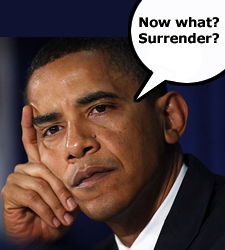 enough. But whatever his motivations or limitations may be, we simply cannot allow ourselves to be confined by them. What America needs is a healthy dose of movement politics – the kind that brought us the five day work week, earned black people the vote, and brought the Vietnam war to an end. It’s the only way fundamental change happens, and we had best start facing that fact.
enough. But whatever his motivations or limitations may be, we simply cannot allow ourselves to be confined by them. What America needs is a healthy dose of movement politics – the kind that brought us the five day work week, earned black people the vote, and brought the Vietnam war to an end. It’s the only way fundamental change happens, and we had best start facing that fact.
That is something the late great Howard Zinn understood. (Very sorry to hear of his passing this week.) And it’s something that gets repeated frequently in these strange days when the closest thing we have to a national progressive party behaves like a timid opposition even while it enjoys the largest majorities it has seen in Congress since the Watergate era. One can, with some justification, fault Obama with being too conciliatory, to modest in his ambitions, too willing to reach out to the other side (particularly in the knowledge that they will be satisfied only with his – and our – complete failure). But Congressional Democrats, by and large, are perhaps the most timid creatures ever to cast a shadow. Sure, there are the Graysons, the Kucinichs, the Sanders (and by each of these I really mean there is only one), but the main body of the caucus in either house is completely cowed by the opposition.
 Whether or not Obama is serious about making positive change, he should understand one thing: the Republican party, particularly those in Congress, will not support him no matter what he does. He could adopt all of their positions (instead of just many of them) and they will still work to destroy him politically. That is their clear objective, whatever noises they make for the cameras and microphones. From a political standpoint, I don’t blame Obama for addressing the G.O.P. retreat this week and taking their questions. I think he should call them out, and we did see a little bit of that today. But if he seriously thinks that they are going to work with him on anything substantive, he is smoking crack. He would be well-advised to start appealing to his base, a.k.a. the people who got him elected, and use his considerable rhetorical gifts to articulate a more progressive vision of governance.
Whether or not Obama is serious about making positive change, he should understand one thing: the Republican party, particularly those in Congress, will not support him no matter what he does. He could adopt all of their positions (instead of just many of them) and they will still work to destroy him politically. That is their clear objective, whatever noises they make for the cameras and microphones. From a political standpoint, I don’t blame Obama for addressing the G.O.P. retreat this week and taking their questions. I think he should call them out, and we did see a little bit of that today. But if he seriously thinks that they are going to work with him on anything substantive, he is smoking crack. He would be well-advised to start appealing to his base, a.k.a. the people who got him elected, and use his considerable rhetorical gifts to articulate a more progressive vision of governance.
Of course, he won’t… unless we really push him. Now would be a good time to start, folks.
luv u,
jp

 Looks to me like the good people of our neighboring commonwealth have seen fit to hand Ted Kennedy’s old seat to Mitt Romney 2.0, a slight upgrade from the original model (this one, at least, confirmably anatomically correct). As far as his political positions are concerned, it’s a mixed bag – a little angry anti-bank populism (People are mad, damn it, and so am I!), a little love for waterboarding, some tin-foil hat-ism, and the usual measure of running away from his most inflammatory comments, like passively questioning president Obama’s origin as the son of two legally married individuals. (Smooth.) There’s also the listing from political side to political side as needed, like voting in favor of Mitt Romney’s statewide health insurance system in Massachusetts, but opposing the national version. He should blend in nicely with the G.O.P. caucus, though poor Jim DeMint will have to forfeit his crown as the party’s Senatorial winged Adonis. (Sad. Very sad.)
Looks to me like the good people of our neighboring commonwealth have seen fit to hand Ted Kennedy’s old seat to Mitt Romney 2.0, a slight upgrade from the original model (this one, at least, confirmably anatomically correct). As far as his political positions are concerned, it’s a mixed bag – a little angry anti-bank populism (People are mad, damn it, and so am I!), a little love for waterboarding, some tin-foil hat-ism, and the usual measure of running away from his most inflammatory comments, like passively questioning president Obama’s origin as the son of two legally married individuals. (Smooth.) There’s also the listing from political side to political side as needed, like voting in favor of Mitt Romney’s statewide health insurance system in Massachusetts, but opposing the national version. He should blend in nicely with the G.O.P. caucus, though poor Jim DeMint will have to forfeit his crown as the party’s Senatorial winged Adonis. (Sad. Very sad.) excuse to openly channel their inner Republican (to the extent that they haven’t been doing it up to now). Of course, with this week’s Supreme Court decision removing any restrictions on the flow of corporate cash into political advertising, any Democrats who maintain a less-than-congenial relationship with Exxon-Mobil, Google, Cargill, or any other firm with deep pockets will likely find their districts flooded with attack ads, paid shills, and every kind of legal sabotage money can buy. Yes, folks – George W. Bush and his reactionary predecessors are truly the gift that keeps on giving. The 5-4 decision to sell our electoral process to the highest bidder was advanced by two Reagan appointees, one Bush I appointee, and (crucially) two Bush II appointees. Is it too late to say, we should have kept W out of the White House?
excuse to openly channel their inner Republican (to the extent that they haven’t been doing it up to now). Of course, with this week’s Supreme Court decision removing any restrictions on the flow of corporate cash into political advertising, any Democrats who maintain a less-than-congenial relationship with Exxon-Mobil, Google, Cargill, or any other firm with deep pockets will likely find their districts flooded with attack ads, paid shills, and every kind of legal sabotage money can buy. Yes, folks – George W. Bush and his reactionary predecessors are truly the gift that keeps on giving. The 5-4 decision to sell our electoral process to the highest bidder was advanced by two Reagan appointees, one Bush I appointee, and (crucially) two Bush II appointees. Is it too late to say, we should have kept W out of the White House? planet itself has seen fit to kick them in the teeth when they were down. I don’t want to write even five more words before encouraging anyone who reads this blog to donate to relief efforts in any way you see fit. (My personal recommendation would be to support
planet itself has seen fit to kick them in the teeth when they were down. I don’t want to write even five more words before encouraging anyone who reads this blog to donate to relief efforts in any way you see fit. (My personal recommendation would be to support 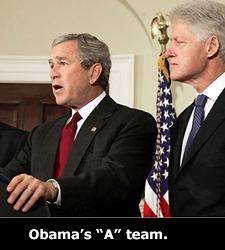 great risks in very dark times to organize the Lavalas political movement that brought Aristide to the presidency in the first place, and subsequently paid a high price at the hands of the U.S.-sanctioned coup regime.
great risks in very dark times to organize the Lavalas political movement that brought Aristide to the presidency in the first place, and subsequently paid a high price at the hands of the U.S.-sanctioned coup regime. President Obama has announced that the “buck” stops with him when things go wrong within the elaborate intelligence apparatus that supports airport security and anti-terrorism in general. But what about with respect to another type of terrorism – the kind we perpetrate on others? Is he willing to accept that “buck” as well? His predecessor certainly wasn’t. Like under Bush II, civilians have been the target of our military in Afghanistan, Iraq, Yemen, Pakistan, and, indirectly, elsewhere. According to the U.N., more than 2,000 civilians were killed in Afghanistan during the first ten months of 2009, about 450 of which are attributable to the U.S. and our allies. That number is probably low, since in every conflict the line is deliberately blurred between combatants and non-combatants, but even if we accept it at face value, 450 deaths represents a lot of suffering, disaffection, and anger. I’m not sure how it is any different to kill hundreds of peasants with unmanned drones than it is to blow up buses or passenger airliners – both are indiscriminate, heinously destructive, and criminal. Both shield the true perpetrators. And both seek to advance a political cause through faceless violence. Will Obama take responsibility for that?
President Obama has announced that the “buck” stops with him when things go wrong within the elaborate intelligence apparatus that supports airport security and anti-terrorism in general. But what about with respect to another type of terrorism – the kind we perpetrate on others? Is he willing to accept that “buck” as well? His predecessor certainly wasn’t. Like under Bush II, civilians have been the target of our military in Afghanistan, Iraq, Yemen, Pakistan, and, indirectly, elsewhere. According to the U.N., more than 2,000 civilians were killed in Afghanistan during the first ten months of 2009, about 450 of which are attributable to the U.S. and our allies. That number is probably low, since in every conflict the line is deliberately blurred between combatants and non-combatants, but even if we accept it at face value, 450 deaths represents a lot of suffering, disaffection, and anger. I’m not sure how it is any different to kill hundreds of peasants with unmanned drones than it is to blow up buses or passenger airliners – both are indiscriminate, heinously destructive, and criminal. Both shield the true perpetrators. And both seek to advance a political cause through faceless violence. Will Obama take responsibility for that? Obama’s administration is, like many of its predecessors, propelled forward into bad policy by the criticisms of some very cynical voices, including some who were primarily responsible for the catastrophic failures of the last regime. It occurs to me that one of the more common Cheneyisms – that we are less safe from attack under Obama – may, in a sense, be grimly true. Cheney, Bush, and his crew nearly destroyed the U.S. empire. They led us into two disastrous wars that drained us of blood, treasure, and international credibility, to say nothing of the death and damage they dealt to the people of Iraq and Afghanistan. Their idiocy at governing knew no bounds, as the destruction of New Orleans and the implosion of our economy amply demonstrated. This is well-known to the leaders of Al Qaeda, I’m certain, just as I’m sure they are aware that terror attacks (and attempted attacks) redound to the political benefit of people like Bush and Cheney. Ergo, if they attack us, they know we are likely to turn around and elect people who will surely bring this country down, and its empire with it.
Obama’s administration is, like many of its predecessors, propelled forward into bad policy by the criticisms of some very cynical voices, including some who were primarily responsible for the catastrophic failures of the last regime. It occurs to me that one of the more common Cheneyisms – that we are less safe from attack under Obama – may, in a sense, be grimly true. Cheney, Bush, and his crew nearly destroyed the U.S. empire. They led us into two disastrous wars that drained us of blood, treasure, and international credibility, to say nothing of the death and damage they dealt to the people of Iraq and Afghanistan. Their idiocy at governing knew no bounds, as the destruction of New Orleans and the implosion of our economy amply demonstrated. This is well-known to the leaders of Al Qaeda, I’m certain, just as I’m sure they are aware that terror attacks (and attempted attacks) redound to the political benefit of people like Bush and Cheney. Ergo, if they attack us, they know we are likely to turn around and elect people who will surely bring this country down, and its empire with it. Thanks to the so-dubbed “underpants” bomber, the T.V. airwaves and blogosphere are all about terrorism, terrorism, terrorism, as if it’s something that just appeared out of nowhere this week. Where the hell has everyone been? I think part of the dynamic at work here is the simple fact that television news people spend a lot of their time on airplanes, and the tightened security that results from these attempted bombings is a real inconvenience to the jet set. (Me? I wouldn’t get on a plane these days unless somebody had a gun to my head.) Not sure if anyone else remembers, but a short time after the Sept. 11, 2001 attacks, it seemed like a lot of television commentators – the McLaughlin Group springs to mind – were complaining piteously about the demise of curbside check-in. Such an inconvenience. However will our civilization survive? (It has, somehow.) That helps to drive the news cycle a bit. I think my cousin had the perfect response at the time: That’s it, no more planes. If I don’t have to fly, you don’t have to fly. End of story.
Thanks to the so-dubbed “underpants” bomber, the T.V. airwaves and blogosphere are all about terrorism, terrorism, terrorism, as if it’s something that just appeared out of nowhere this week. Where the hell has everyone been? I think part of the dynamic at work here is the simple fact that television news people spend a lot of their time on airplanes, and the tightened security that results from these attempted bombings is a real inconvenience to the jet set. (Me? I wouldn’t get on a plane these days unless somebody had a gun to my head.) Not sure if anyone else remembers, but a short time after the Sept. 11, 2001 attacks, it seemed like a lot of television commentators – the McLaughlin Group springs to mind – were complaining piteously about the demise of curbside check-in. Such an inconvenience. However will our civilization survive? (It has, somehow.) That helps to drive the news cycle a bit. I think my cousin had the perfect response at the time: That’s it, no more planes. If I don’t have to fly, you don’t have to fly. End of story.  There is also a strong presumption on the part of the Cheneys, the Buchanans, the Lindsey Grahams, etc., against treating terrorism cases as criminal matters rather than through military means. These people seem to have no faith in our justice system whatsoever. Do they really think it’s going to be hard to convict this Nigerian guy? The system is designed to put black people in jail under pretty much any circumstances, thanks in large measure to “conservatives”. For chrissake, it took just the mere mention of terrorism for them to give Jeff Leurs 22 years in a maximum security hell hole when he set fire to 3 pickup trucks at a car dealership with no intention to cause bodily harm to anyone. This case can easily be handled in the context of our courts. The Cheneys and Buchanans of the world are eager to apply the thumbscrew as well, in the full knowledge that to do so is illegal, immoral, unethical… and ineffective. But the desire to resort to torture is such an integral part of their worldview now – it is their way of appealing to the worst in all of us.
There is also a strong presumption on the part of the Cheneys, the Buchanans, the Lindsey Grahams, etc., against treating terrorism cases as criminal matters rather than through military means. These people seem to have no faith in our justice system whatsoever. Do they really think it’s going to be hard to convict this Nigerian guy? The system is designed to put black people in jail under pretty much any circumstances, thanks in large measure to “conservatives”. For chrissake, it took just the mere mention of terrorism for them to give Jeff Leurs 22 years in a maximum security hell hole when he set fire to 3 pickup trucks at a car dealership with no intention to cause bodily harm to anyone. This case can easily be handled in the context of our courts. The Cheneys and Buchanans of the world are eager to apply the thumbscrew as well, in the full knowledge that to do so is illegal, immoral, unethical… and ineffective. But the desire to resort to torture is such an integral part of their worldview now – it is their way of appealing to the worst in all of us. You’ve heard (way too many times) the facile comparison between legislating and making sausage. It’s the kind of analogy that obscures the spectacular level of dysfunction now most impressively on display in the U.S. Senate. This institution has always been a problem with respect to the popular will, but under the current circumstances, the “world’s greatest deliberative body” has become not the cooling saucer of democracy but a dousing bucket of cold water. There is, of course, no question that the Senate is an extremely undemocratic institution, according the same number of votes and, therefore, the same political power to every state, whether it is home to 36 million (California) or 500,000 (Wyoming). Even if the chamber’s arcane rules allowed for voting on a majority-rule basis, it would be intrinsically unfair to larger population centers – i.e. the kinds of communities that most rely on social programs administered by the federal government.
You’ve heard (way too many times) the facile comparison between legislating and making sausage. It’s the kind of analogy that obscures the spectacular level of dysfunction now most impressively on display in the U.S. Senate. This institution has always been a problem with respect to the popular will, but under the current circumstances, the “world’s greatest deliberative body” has become not the cooling saucer of democracy but a dousing bucket of cold water. There is, of course, no question that the Senate is an extremely undemocratic institution, according the same number of votes and, therefore, the same political power to every state, whether it is home to 36 million (California) or 500,000 (Wyoming). Even if the chamber’s arcane rules allowed for voting on a majority-rule basis, it would be intrinsically unfair to larger population centers – i.e. the kinds of communities that most rely on social programs administered by the federal government.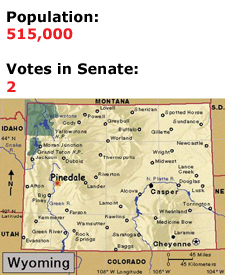 The current situation in the Senate is such that the filibuster is a constant, a given. So the notion that any meaningful action will take place within its walls – landmark legislation supported by a broad swath of the American public – is beyond contemplation. It would be difficult under majoritarian voting procedures, but the 60-vote minimum requires the inclusion of so many watery centrists and “Democrats in name only” that the guts are always ripped out of whatever is under consideration. This is certainly true of the health insurance reform legislation. This will also be true of any other major initiative. After this year’s experience, I am doubtful that they will even attempt to take up the Employee Free Choice Act… and I’m certain that, if they did, the Ben Nelsons (representing 1.8 million), Mary Landrieus (representing 4.8 million), and Joe Liebermans (representing 3.5 million) will easily thwart the will of members representing twice, three times, and even eight times as many people.
The current situation in the Senate is such that the filibuster is a constant, a given. So the notion that any meaningful action will take place within its walls – landmark legislation supported by a broad swath of the American public – is beyond contemplation. It would be difficult under majoritarian voting procedures, but the 60-vote minimum requires the inclusion of so many watery centrists and “Democrats in name only” that the guts are always ripped out of whatever is under consideration. This is certainly true of the health insurance reform legislation. This will also be true of any other major initiative. After this year’s experience, I am doubtful that they will even attempt to take up the Employee Free Choice Act… and I’m certain that, if they did, the Ben Nelsons (representing 1.8 million), Mary Landrieus (representing 4.8 million), and Joe Liebermans (representing 3.5 million) will easily thwart the will of members representing twice, three times, and even eight times as many people.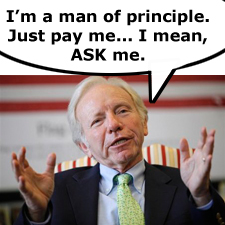 Looks like the bottom is falling out of the legislative health insurance reform effort. Oh, there may be a bill, but the political legs are getting very wobbly. All of the compromises and fall-backs the left has agreed to over the past year have been painted as too radical for the public at large, even though the public at large broadly supports elements like the “public option” and expansion of Medicare to people under 65. In other words, the majority of people in the United States think there should be some kind of government provided health insurance available to everyone, not just retirees, veterans, and people in the United States Congress… but Joe Lieberman and 40 G.O.P. senators don’t want it, so it’s not going to happen. Small wonder that more recent polling by one of the major networks and the Wall Street Journal shows a majority now against the health care legislation under consideration in the Senate. Someone should poll Lieberman and make sure that he’s mostly happy now, since that’s all that seems to matter.
Looks like the bottom is falling out of the legislative health insurance reform effort. Oh, there may be a bill, but the political legs are getting very wobbly. All of the compromises and fall-backs the left has agreed to over the past year have been painted as too radical for the public at large, even though the public at large broadly supports elements like the “public option” and expansion of Medicare to people under 65. In other words, the majority of people in the United States think there should be some kind of government provided health insurance available to everyone, not just retirees, veterans, and people in the United States Congress… but Joe Lieberman and 40 G.O.P. senators don’t want it, so it’s not going to happen. Small wonder that more recent polling by one of the major networks and the Wall Street Journal shows a majority now against the health care legislation under consideration in the Senate. Someone should poll Lieberman and make sure that he’s mostly happy now, since that’s all that seems to matter.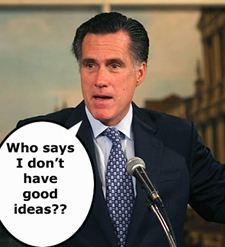 Okay, so… look at the poll again. Something like 55% of those surveyed say the country is going in the “wrong direction.” What the hell does that mean? Wasn’t it going in the wrong direction last year as well, under Bush? Are we to assume that this means that a majority wants to elect Republicans, the folks who work tirelessly for the failure of the kind of health reform most people support (e.g. single payer, public option, Medicare expansion)? If this is like most political polls, it’s just a simple question – is the country moving in the right direction: yes, no, undecided. It seems as though, as with support for the war, there is an expectation on the part of those being polled that all one needs to do is vote every two years, sit back, fold your arms, and wait for the change to come in the mail. A portion of that is, I would guess, a function of how disconnected most respondents feel with the policy…. Yeah, war is bad, but I don’t have to fight it, so go for it. Yeah, being grievously ill without health coverage is bad, but it probably won’t happen to me, so leave everything the way it is.
Okay, so… look at the poll again. Something like 55% of those surveyed say the country is going in the “wrong direction.” What the hell does that mean? Wasn’t it going in the wrong direction last year as well, under Bush? Are we to assume that this means that a majority wants to elect Republicans, the folks who work tirelessly for the failure of the kind of health reform most people support (e.g. single payer, public option, Medicare expansion)? If this is like most political polls, it’s just a simple question – is the country moving in the right direction: yes, no, undecided. It seems as though, as with support for the war, there is an expectation on the part of those being polled that all one needs to do is vote every two years, sit back, fold your arms, and wait for the change to come in the mail. A portion of that is, I would guess, a function of how disconnected most respondents feel with the policy…. Yeah, war is bad, but I don’t have to fight it, so go for it. Yeah, being grievously ill without health coverage is bad, but it probably won’t happen to me, so leave everything the way it is.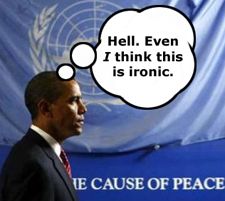 Obama does Oslo this week. There’s been a lot of commentary on this, including my own, so I won’t add much at this point. Suffice to say, he’s collecting the award the Norwegian Nobel committee gave the people of the United States for electing someone who isn’t totally bug-fuck nuts and for putting the enormous American imperial locomotive back onto its tracks. Yeah, it’s still belching toxic smoke and running people over, but it’s doing it along a predictable line, pulling a bunch of lesser cars behind it, and that makes people a lot more comfortable. Let’s face it – Dubya thought the train was a go-cart. He drove it on the grass, into the middle of the street, through people’s living rooms, etc., to the point where no one wanted to hitch-up their boxcar anymore (except our trusty coal-car Britain and, I don’t know, Palau). Now that choo-choo Charlie has chugged his scrawny ass back to Texas, everybody wants back onto the empire gravy train. So… give the guy a medal. Civilization is saved!
Obama does Oslo this week. There’s been a lot of commentary on this, including my own, so I won’t add much at this point. Suffice to say, he’s collecting the award the Norwegian Nobel committee gave the people of the United States for electing someone who isn’t totally bug-fuck nuts and for putting the enormous American imperial locomotive back onto its tracks. Yeah, it’s still belching toxic smoke and running people over, but it’s doing it along a predictable line, pulling a bunch of lesser cars behind it, and that makes people a lot more comfortable. Let’s face it – Dubya thought the train was a go-cart. He drove it on the grass, into the middle of the street, through people’s living rooms, etc., to the point where no one wanted to hitch-up their boxcar anymore (except our trusty coal-car Britain and, I don’t know, Palau). Now that choo-choo Charlie has chugged his scrawny ass back to Texas, everybody wants back onto the empire gravy train. So… give the guy a medal. Civilization is saved!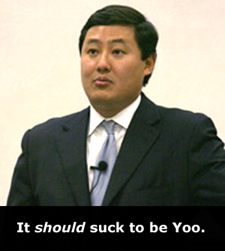 I think it was
I think it was  Now explain to me why, when committing 30,000 more Americans to this endless debacle in Afghanistan, you aren’t asking those of us who are not in the military to make some real sacrifices. You invoked the noble acts of some of your predecessors, but they were not reluctant to ask for the able-bodied to serve (even if many had “other priorities”) or the relatively well-heeled to pay more taxes. Why are you so reluctant? Don’t feel as though I’m singling you out. I could, of course, ask this question of George W. Bush, Bill Clinton, George H. W. Bush, and the sainted Ronald Reagan with equal justice. The difference, I believe, is that you are probably brighter and more worldly than any of them. I know what their excuses would have been. What is yours?
Now explain to me why, when committing 30,000 more Americans to this endless debacle in Afghanistan, you aren’t asking those of us who are not in the military to make some real sacrifices. You invoked the noble acts of some of your predecessors, but they were not reluctant to ask for the able-bodied to serve (even if many had “other priorities”) or the relatively well-heeled to pay more taxes. Why are you so reluctant? Don’t feel as though I’m singling you out. I could, of course, ask this question of George W. Bush, Bill Clinton, George H. W. Bush, and the sainted Ronald Reagan with equal justice. The difference, I believe, is that you are probably brighter and more worldly than any of them. I know what their excuses would have been. What is yours? Indeed, we do not even seem to be aware of how self-defeating our efforts in Afghanistan truly are.
Indeed, we do not even seem to be aware of how self-defeating our efforts in Afghanistan truly are. 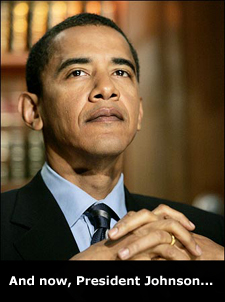 surely passed, and while the announcement, as of this writing, has not yet been made, it’s clear that something like 30,000 to 35,000 more American bodies will be placed between the religious fanatics, drug smugglers, blood-stained warlords, and underworld entrepreneurs that dominate both sides of the Afghan struggle. To what end? Well, we’ve been promised that Obama will explain his strategy in a nationally-televised address this coming week. My guess is that it will be somewhat reminiscent of Bush Jr.’s address announcing the surge in Iraq – a change of strategy concentrating on the fundamentals of securing and holding territory, investing more dollars in reconstruction, and promoting regional cooperation. Bush’s speech was in the wake of the major disaster that his team had created in Iraq, prompting the U.S. institutional foreign policy establishment to, in essence, reassert itself and save the empire. In Obama’s case, concern for the empire is at the very center of his administration, and the burden of rescuing it will continue to be consigned to our “all-volunteer” military force. Whatever the stated strategy may turn out to be, that is the underlying motivation.
surely passed, and while the announcement, as of this writing, has not yet been made, it’s clear that something like 30,000 to 35,000 more American bodies will be placed between the religious fanatics, drug smugglers, blood-stained warlords, and underworld entrepreneurs that dominate both sides of the Afghan struggle. To what end? Well, we’ve been promised that Obama will explain his strategy in a nationally-televised address this coming week. My guess is that it will be somewhat reminiscent of Bush Jr.’s address announcing the surge in Iraq – a change of strategy concentrating on the fundamentals of securing and holding territory, investing more dollars in reconstruction, and promoting regional cooperation. Bush’s speech was in the wake of the major disaster that his team had created in Iraq, prompting the U.S. institutional foreign policy establishment to, in essence, reassert itself and save the empire. In Obama’s case, concern for the empire is at the very center of his administration, and the burden of rescuing it will continue to be consigned to our “all-volunteer” military force. Whatever the stated strategy may turn out to be, that is the underlying motivation. comfortable thing to do what’s right. If stopping these wars cost Obama his job, I would hope he would consider it well worth the cost – I can think of worse things to be remembered for… like driving us into another decade of this pointless death and destruction. But to ignore the political calculus of overseas military entanglements is to ignore history. Absent vigorous anti-war activism right here at home – to the tune of many, many thousands in the streets – all of the prevailing political winds will blow Obama toward increasing deployments of military resources to the Afghan “trap”, as Bin Laden called it. As I’ve said in this blog before (probably too many times), this is one of the perils of empire: our foreign policy is supported by a professionalized foreign legion made up of volunteers and mercenaries (or, if you prefer, “contractors”) and floated by borrowed capital, thereby insulating the vast majority of our population from the actual costs of war.
comfortable thing to do what’s right. If stopping these wars cost Obama his job, I would hope he would consider it well worth the cost – I can think of worse things to be remembered for… like driving us into another decade of this pointless death and destruction. But to ignore the political calculus of overseas military entanglements is to ignore history. Absent vigorous anti-war activism right here at home – to the tune of many, many thousands in the streets – all of the prevailing political winds will blow Obama toward increasing deployments of military resources to the Afghan “trap”, as Bin Laden called it. As I’ve said in this blog before (probably too many times), this is one of the perils of empire: our foreign policy is supported by a professionalized foreign legion made up of volunteers and mercenaries (or, if you prefer, “contractors”) and floated by borrowed capital, thereby insulating the vast majority of our population from the actual costs of war.